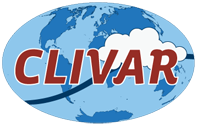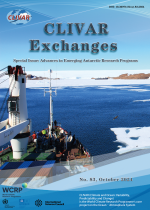The 2020 Ocean Sciences Meeting will be held February 16-21 in San Diego, California. A list of US CLIVAR-sponsored sessions along with Town Halls, events, workshops, and other sessions that may be of interested to the US CLIVAR community was put together. The list is being regularly updated until September 11, 2019. For more information, please refer to the...
News
Several Institutions in Ecuador organized an international panel to discuss the possible contributions of the country to the United Nations Decade of Ocean Science for Sustainable Development (2021-2030) which has the goal to support efforts to reverse the cycle of decline in ocean health and gather ocean stakeholders worldwide behind a common framework that will ensure ocean...
Prof. Lixin Wu has been awarded the AGU Ambassador Award according to the press release announced by AGU on August 22, 2019. AGU Fellow is conferred on recipients of the Award.
Prof. Lixin Wu served as a CLIVAR SSG member from 2013 to 2017, he is also a member of the Chinese Academy of Sciences, President of Qingdao National Laboratory for Marine Science and Technology (QNLM), and the...
A workshop was held in December 2018 (pre-AGU) focused on estimating freshwater fluxes from the Greenland Ice Sheet. It was sponsored by the National Science Foundation, and co-hosted by CLIVAR and CliC projects OMDP, NORP, and ISMIP6. The workshop had ~40 international participants from a variety of disciplines (oceanography, glaciology,...
Under the auspices of the WCRP Climate Science Week at the AGU Fall Meeting 2019, this Joint Early Career Researcher Workshop will bring together students and early career researchers to discuss a joint perspective on the water cycle and governance under climate change. Applications to attend the...
Hosted by ICTP, the 4th Session of CLIVAR Eastern Boundary Upwelling Systems Research Foci (EBUS RF) met on 20-21 July 2019 in Trieste, Italy, right after the ICTP-CLIVAR Summer School on Oceanic Eastern Boundary Upwelling Systems, which took place from 15 to 19 July 2019.
The meeting specially focused on the...
Eastern Boundary Upwelling Systems (EBUS) are areas of important biological productivity and high fluxes of energy and matter between the atmosphere and ocean. However, their future under intense anthropogenic pressure is uncertain. Improved observations and theoretical understanding of the main physical and biogeochemical processes that link planetary and basin...
Figure 2: Multiple concepts of high-end sea-level. The x-axis is the amount of sea-level rise for a given time-interval. In the vertical the figure displays the probability density. The blue curve represents a combined pdf for all possible emission scenarios. The grey and red building blocks have to be added to the RCP curves depending...
The Agreement on hosting of the International CLIVAR Project Office (ICPO) has been signed between the First Institute of Oceanography of the Ministry of Natural Resources, China (FIO, MNR) and the World Climate Research Programme (WCRP) on July 11, 2019. According to the agreement, FIO will continue to host ICPO from July 2019 to June 2024 in Qingdao, China.
The ICPO...
Session Description:
This session highlights water cycle research that describes the linkages between the ocean, atmosphere, and land hydrology. Contributions are invited on all aspects of water cycle research including analyses undertaken using in situ and spaceborne observations from current (e.g., SMAP, SMOS, GRACE-FO, GPM, GCOM-W), past (e.g., Aquarius, TRMM, GRACE...
The 2019 AGU Fall Meeting will be held from December 9-13 in San Francisco, California. In preparation for the meeting, we have compiled a list of sessions that are relevant to the community and organized by our Panels, Research Foci and community members. The list of sessions is not intended to be exhaustive but to...
The Indian Ocean is warming faster than any of the global oceans and its climate is uniquely driven by the presence of a landmass at low latitudes, which causes monsoonal...
MedECC is pleased to invite you to become a reviewer of the 1st MedECC Assessment Report (MAR1) on current state and risks of climate and environmental change in the Mediterranean.
...The CLIVAR endorsed activity, PICES WG-40 (Climate and Ecosystem Predictability), was successfully organized and hosted by the First Institute of Oceanography, MNR, Qingdao China during 20-22 June. The theme of this workshop was 'Towards an integrated approach to understanding ecosystem predictability in the North Pacific'.
The aim of this workshop was to deepen the understanding of the...
























